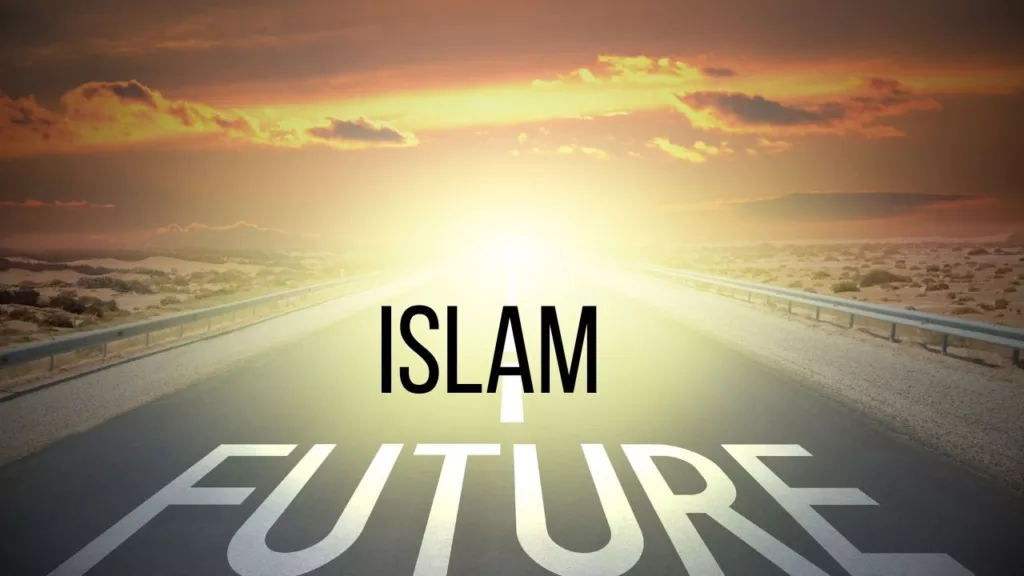Future of Islam | Navigating the Bright | 2023
Navigating the Modern World: Islam's Evolution in the 21st Century

Future of Islam
Islam faces challenges related to adapting to globalization, preserving traditional values in a changing world, addressing gender equality, combating Islamophobia, and engaging in interfaith dialogue.

- Lesson of Tawakkul
- Importance of Peace and Tolerance in Islam
- Quranic Prophecy
- Laylatul Qadr 2023 | Significance | Importance | Full Guide
- Muslim Inventions Since 610 A.D to 2023
Introduction
The future of Islam is a topic of great significance, as it not only impacts the lives of millions of Muslims but also plays a vital role in shaping global dynamics. In this article, we will delve into the challenges and opportunities that lie ahead for Islam in the modern world. We will explore how Islam is adapting to the changing times while preserving its core values.
Islam in a Globalized World
In an increasingly interconnected world, Islam faces both challenges and opportunities. Globalization has brought Muslims closer to people of diverse faiths and cultures. This interconnectedness has led to greater dialogue and understanding among different religious groups. However, it has also posed challenges in terms of preserving Islamic identity and values in a multicultural environment.
Modernity and Islamic Tradition
The tension between modernity and traditional Islamic values is a significant aspect of the future of Islam. Muslims around the world are grappling with how to adapt to the technological and social changes of the 21st century while staying true to their faith. The key lies in striking a balance between progress and tradition.
What are the major challenges facing Islam in the modern world?
Islam faces challenges related to adapting to globalization, preserving traditional values in a changing world, addressing gender equality, combating Islamophobia, and engaging in interfaith dialogue.
How is Islam adapting to the process of globalization?
Islam is adapting to globalization by engaging with diverse cultures and fostering dialogue, while still maintaining its core values and beliefs.
What role does modernity play in the future of Islam?
Modernity presents a tension for Islam as Muslims seek to balance progress with traditional values, aiming to reconcile technological and social changes with their faith.
What progress has been made in terms of gender equality and women’s rights within Islam?
Many Muslim-majority countries are making strides in promoting women’s education and participation in public life. There is also a growing movement to reinterpret traditional teachings to align with gender equality principles.
How can Islamophobia be addressed in the future?
Addressing Islamophobia involves countering stereotypes and misconceptions about Islam through education and awareness campaigns, promoting dialogue, and fostering a sense of pride in the Islamic identity.
Gender Equality and Women’s Rights
The future of Islam is closely linked to issues of gender equality and women’s rights. Many Muslim-majority countries are making strides in promoting women’s education and participation in public life. There is a growing movement within Islam to reinterpret traditional teachings to align with gender equality principles, opening up new possibilities for Muslim women.
Islamophobia and Identity
Islamophobia remains a significant challenge in many parts of the world. Muslims face discrimination and prejudice based on their faith. However, this adversity has also led to a strengthening of Islamic identity. Many Muslims are actively working to counter stereotypes and misconceptions about Islam, fostering a sense of pride in their religion.
Interfaith Dialogue and Cooperation
One of the most promising developments for the future of Islam is the increasing emphasis on interfaith dialogue and cooperation. Muslims are engaging with people of other faiths to promote understanding and collaboration. This has the potential to build bridges and promote peaceful coexistence in a world often marked by religious tensions.
Environmental Stewardship
Environmental challenges are a concern for all of humanity, and Islam is no exception. There is a growing movement within the Muslim world to address environmental issues from an Islamic perspective. Many Islamic scholars and leaders are advocating for responsible stewardship of the Earth, aligning with the broader global effort to combat climate change.
Youth and Technology
The youth are the future of any society, and this holds true for Islam as well. Muslim youth are using technology and social media to connect, express their views, and effect change. The digital age offers new avenues for religious education and outreach, allowing Islam to reach a wider audience.
Conclusion
The future of Islam is a complex tapestry of challenges and opportunities. As Muslims navigate the modern world, they must grapple with issues of identity, gender equality, and Islamophobia while also engaging in interfaith dialogue, promoting environmental stewardship, and harnessing the power of technology. The future of Islam will be shaped by how Muslims address these challenges and seize the opportunities before them, all while staying true to the core values of their faith.
What is the significance of interfaith dialogue in the future of Islam?
Interfaith dialogue is crucial for building understanding and cooperation among different religious groups, helping to bridge gaps and promote peaceful coexistence.
How is Islam contributing to environmental stewardship?
There is a growing movement within the Muslim world to address environmental issues from an Islamic perspective, with scholars and leaders advocating for responsible stewardship of the Earth.
How are Muslim youth utilizing technology for the future of Islam?
Muslim youth are using technology and social media to connect, express their views, and effect change. The digital age offers new avenues for religious education and outreach.
What is the role of Islamic scholars and leaders in shaping the future of Islam?
Islamic scholars and leaders play a vital role in guiding the Muslim community, interpreting religious teachings in light of contemporary challenges, and promoting dialogue and cooperation.
How can individuals contribute to the future of Islam?
Individuals can contribute by actively engaging in interfaith dialogue, supporting gender equality initiatives, countering Islamophobia, promoting environmental stewardship, and using technology for positive outreach and education.





